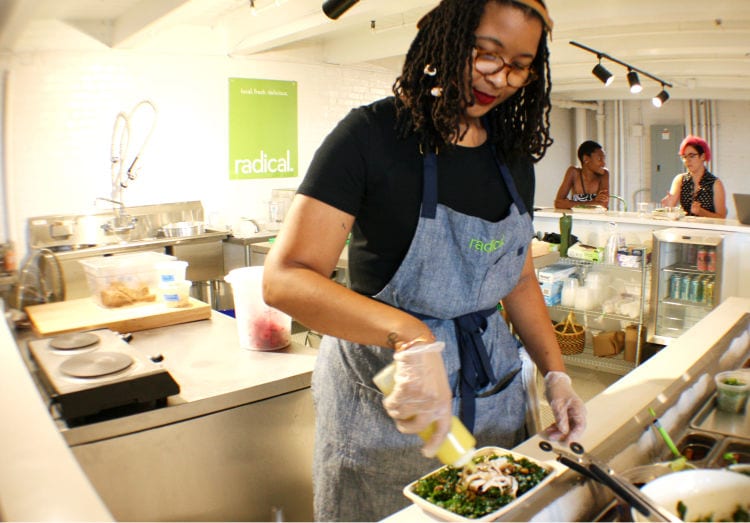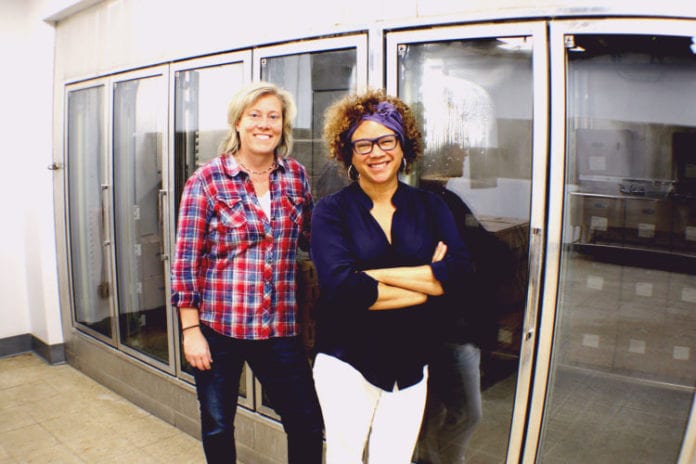Eating local in Memphis is risky — not for the consumer who gets a delicious, nutrient-rich product but for farmers and wholesale buyers.
“Currently we see that farmers want to grow into Memphis and chefs want to buy from Memphians, but making sure that the supply and demand are happening concurrently, that’s the challenge of building a local food economy,” said Dr. Heather Jamerson, cofounder of 275 Food Project alongside Diane Terrell.
Jamerson and Terrell say the region lacks coordinators to grow supply alongside demand and help farmers and buyers connect. Most farmers and buyers aren’t able to take big risks alone. Terrell and Jamerson’s research shows around one percent of proteins and produce grown in the Mid-South make it to area restaurants, grocers, schools and other wholesale channels.
Both Jamerson and Terrell are self-proclaimed foodies with backgrounds in philanthropy and years spent working in community development in Memphis. They left foundation jobs and launched 275 Food Project in October 2018 to begin filling gaps they saw in the local food economy. The name is a nod to the Mid-South regional food economy’s roughly 275-mile radius.
Since October, 275 Food has assembled an impressive list of ambitious projects.
“There is a strategy behind these initiatives. They’re not just opportunistic, they’re actually laid out to drive population level outcomes,” said Jamerson.
To up local food supplies, 275 Food funded a new Memphis-based coordination, distribution and warehousing facility with partner New South Produce Cooperative and has begun identifying farmers, restaurants and others willing to take a risk together. They’re also investing in growing demand and ensuring minority chefs and food entrepreneurs have opportunities to capitalize on the momentum they hope to build.
“A lot of our work is about ensuring equity across the entire food economy,” said Terrell. “It means ensuring emerging chefs of color, women chefs have access to opportunities in the local food economy whether it be in the kitchen, front of house, ownership opportunities.”
275 Food is launching a container restaurant in Soulsville slated to open in August. The name and menu have yet to be released, but its most exciting feature is its Ground Up Initiative, an 18-month culinary and entrepreneurial fellowship for emerging Memphis chefs of color in partnership with restaurateurs Amanda Krog and chef Dave Krog.
The fellowship offers extensive training, a $40,000 annual stipend and a chance to meet with mentors and investors. Applications can be found here and are due by July 9.
“The container restaurant is envisioned to move the neighborhood to the front edge of where trends are going in casual dining,” said Terrell, while also ensuring it serves South Memphis residents and encourages minority chefs to build the career they want.

Terrell and Jamerson are quick to note there are many women and people of color working in the food industry in Memphis, but the types of jobs and salaries available are often limited.
“When you rise above line cook into the sous chef and chef positions, the pay scales go up significantly, and those are positions that have typically been reserved for white, [male] professionals,” said Terrell.
275 Food helped launch Downtown’s Puck Food Hall in May and secured a commitment to minority vendors and local suppliers. They’re in the process of reactivating a commercial kitchen and event venue on Mud Island and finalizing a 6-month mentorship program for women chefs in partnership with chef Kelly English.
In the next three to five years, 275 Food Project hopes its combined efforts will grow the local food economy from one percent local spending to 20 percent. The benefits, they say, are healthier communities, a more equitable food system and big bucks.
Research firm Mass Economics explored the impact of increased local sourcing for restaurants, institutional procurement and food and beverage manufacturing in the Mid-South and found a shift to just 20 percent local spending could move $1.5 billion back into the local food economy.
From Farm
Matthew Robinson farms land that has been in his family for four generations. His farm, The Produce Tribe, is in Stanton, Tennessee roughly 50 miles northeast of Memphis. He’s experimenting with growing hemp and a holistic health product line, but his primarily focus is produce. He sells at farmers markets and to wholesalers regionally.
Robinson is in a minority, not only as an African American farmer but as a local small-scale farmer producing food crops intended for Mid-South consumers. Research by Karen Karp & Partners and Mass Economics in 2017 showed 75 percent of the Mid-South’s agricultural revenue comes from exporting four crops — corn, soy, rice and cotton.
Without a strong local food economy, Robinson has struggled to find reliable distribution networks and fair prices for his product.
“It’s definitely about finding marketing streams for your product,” he said. “One particular problem I was having was wholesale channels and the very low price point I was getting.”
Robinson started working with New South this spring. New South handles contracts with chefs, pickups from farmers and other supports in partnership with 275 Food.
“Their prices are much more fair,” said Robinson. “Food hubs and institutions like New South need the support of the local community and restaurants and chefs more than anything. Without them, it makes farming a lot harder.”
New South got its start in Little Rock, but 275 Food allocated funding from a Heifer International grant to launch operations in Memphis at 275 Food’s headquarters, Harbor Landing on Mud Island. New South is critical to increasing local food spending because its philanthropic dollars can absorb the low-profits and risks of coordinating a fledgling food economy.
To Fork
Harbor Landing is owned by the City of Memphis and operated by the Memphis River Parks Partnership. Built in the late 1970s, it was long ago abandoned for use as a storage facility. Soon the space will house not only New South’s distribution facilities and 275 Food’s offices but a commercial kitchen, food storage and event venue available to emerging chefs and the public to connect over locally grown food.
The venue offers a sweeping view of Mud Island’s harbor and a bar area for smaller events. Terrell said the city, MRPP and 275 Food are all thrilled to see the space reactivated.
Terrell and Jamerson also joined Puck Food Hall as vendors with their own locally-sourced, organic salad company, Radical. The experience gave them critical insights into local sourcing and what it takes to be successful food professionals. Robinson’s lush greens are often featured in Radial’s salads, and their general manager, Yolanda Manning, is using the space to incubate her own vegan dessert business.
“It became mandatory when we launched 275 that we walk the talk,” said Terrell. “When we got involved with the food hall, we saw an opportunity to launch a vehicle for the produce, proteins, meats and dairy that our farmers were producing.”

Growing from Soulsville
The Soulsville container restaurant will be located at College Street and Walker Avenue and surrounded by some of the neighborhood’s biggest assets including Chandler Park, the Stax Museum, Memphis Rox, LeMoyne-Owen College and several grade schools.
Terrell was executive director of the Grizzlies Foundation when the foundation renovated Chandler Park in 2017. The idea for the container restaurant grew from that work and the Grizzlies Foundation is a partner in the project.
Jamerson, Terrell and restaurateurs Dave and Amanda Krog partnered to design the restaurant and its programs. New South will help supply the kitchen. The partners will wait for additional community input to finalize the concept but are considering ways to serve Soulsville like tiered pricing, work study programs with schools and connecting to LeMoyne-Owen’s meal program.
“We want big ears and our mouths closed. We can be the most effective when we listen to them — them being the neighborhood, them being the emerging chefs,” said Dave Krog.
The restaurant’s central program will be its Ground Up Initiative.
U.S. labor statistics show only 17 percent of chefs and head cooks are Black or African American. Terrell and Jamerson are working to fund research on Memphis’ food entrepreneurs but anecdotally estimate 400 non-chain food establishments in the city and less than 30 that are Black-owned.
“It’s not because there’s a talent gap, it’s because there’s an opportunity gap,” said Jamerson.
In Soulsville, emerging Memphis chefs of color will be hired as Ground Up Fellows and given access to entrepreneurial and culinary training, mentorships, investors and more. They’ll run their own kitchen, set menus and learn staffing and food costs. Chef Dave Krog is the lead mentor and said the goal is to take talented chefs from underserved communities and fast track them through everything they’ll need to be Memphis’ newest elite chefs.
“That doesn’t mean less work, it just means opening doors,” said Dave.
Dave grew up low-income in Tampa, Florida, and Amanda’s mom was a single parent who waited tables. They say they understand the value of exposure and hands-on experience.
“If you come from an underserved area, you don’t have access to ingredients,” said Dave. “You have to be in a restaurant that is using these things, you have to be with a chef that’s willing to let you touch these things.”
The Krogs are set to open Dory, their first fine dining, farm-to-fork restaurant, in November.
“We were fortunate enough to have people introduce us. We want to pass that on,” said Amanda. “[The fellowship] is for somebody that is passionate about whatever food is in their own heart. We’re going to find people that have the ingredients, find the people that will help market them.”
For Terrell and Jamerson, the Ground Up Initiative is a key component to getting to that 20 percent local spending, but success may mean 275 Food Project is made obsolete.
“As soon as we hit that 20 percent mark, there will be a flywheel effect where an organization like 275 Food may or may not even be needed,” said Jamerson. “You have the relationships between those farmers and chefs and those procurement officers, etc. That’s when the market can really take over.”
“We joined an existing food ecosystem that has pockets of real success and lots of experience. So what we saw were the gaps and we exist to try to close some of those gaps,” said Terrell.


